
 Tyler Kuehl
The Hockey Writers
Tyler Kuehl
The Hockey Writers
40
Reads
0
Comments
NCAA Hockey National Championship History: The 1990s
*This post is the fifth installment in a series that looks at the NCAA men’s ice hockey national champions, beginning with the 1940s. Here are the decades that have already been covered:
- NCAA Hockey National Championship History: The 1940s & 1950s
- NCAA Hockey National Championship History: The 1960s
- NCAA Hockey National Championship History: The 1970s
- NCAA Hockey National Championship History: The 1980s
Since the initial NCAA tournament in Colorado Springs in 1948, 72 programs have been crowned the best team in college hockey in the United States. Some have won more than others, but all are proud to be champions, even if it was only once.
The WCHA’s stranglehold on the Frozen Four scene had started to wither away, with teams from the CCHA such as Michigan State and Lake Superior State capturing the gold in the 1980s. Similar to how grunge music became popular in the early part of the decade, the CCHA and Hockey East started to take the country by storm in the 1990s.
1990: University of Wisconsin
Since winning their last championship in 1983, the Wisconsin Badgers had fallen on hard times. From 1984 to 1987, they did not even make it to the tournament. When Wisconsin did qualify the following two seasons, they lost both times in the quarterfinal.
In 1989-90, something changed. A team with experienced talent and a stacked lineup began to tear through the WCHA. The Badgers finished with a 28-9-1 record, good enough for the top spot in the conference. Chris Tancill and All-American Gary Shuchuk led the charge, with Shuchuk leading the team with 80 points, finishing fifth in the country in scoring. (from ‘Three to join Adirondack Hockey Hall of Fame on Saturday,’ The Post Star, 01/05/ 2018)
After winning the WCHA conference championship, the Badgers made easy work of the Maine Black Bears in the quarterfinals, followed by a win over Hockey East champion Boston College in the semis. This setup a meeting with upstart Colgate in the championship game, and even though the Raiders had the advantage in shots, the Badgers made the most of their opportunities. John Byce’s hat trick led Wisconsin to their fifth national championship with a final score of 7-3.
1991: Northern Michigan University
Following Lake Superior State’s championship in 1988, there was only one team left in the Upper Peninsula of Michigan that had yet to win a title. Northern Michigan had been a solid program for the majority of their existence, inlcuding a berth in the championship game in 1980.
Related: Top 10 Hobey Baker Winners of All-Time
In the 1990-91 season, everything seemed to click for the Wildcats, especially on offence. The team’s 283 goals were the most by any team in the NCAA that season, and their +150 goal differential still ranks up there as one of the best single season team performances. All-American Scott Beattie was at the forefront of the Wildcat offence, leading the country in scoring with 89 points.
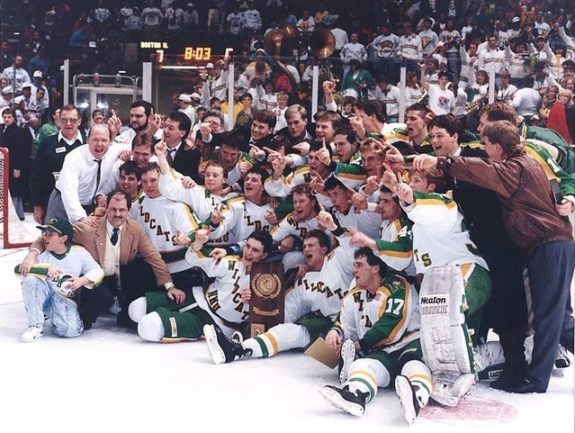
After clinching the WCHA regular season and conference championships, Northern Michigan trounced Alaska-Anchorage in the quarterfinal before knocking off Maine in the semis to meet with Boston University in the championship game.
It was the greatest college hockey game ever. Period.
The Wildcats fell behind 3-0 in the opening period, before scoring six unanswered in the second to take the lead. Even with a 7-4 lead in the third, the Terriers stormed back with three in the final eight minutes to tie the game. The first two overtimes saw no victor. Then, early in the third overtime, Mark Beaufait set up Darryl Plandowski for his third goal of the game, giving the Wildcats their first championship.
1992: Lake Superior State University
Only four years removed from their 1988 championship, the Lakers were feeling hungry and motivated coming into the 1991-92 season, especially after being upset by Clarkson in the 1991 quarterfinals.
The Lakers were exceptional, going 22-9-4 in the regular season, but finished short of Michigan for the No. 1 seed in the CCHA. The trio of Paul Constenitn, Sandy Moger and All-American Mark Astley were the offensive threats for LSSU, but it was the play of All-American netminder Darrin Madeley that was the key to the Lakers’ success. Madeley went 25-6-4, with a 2.07 goals-against-average (GAA) and .917 save-percentage (SV%), both the best in the NCAA.
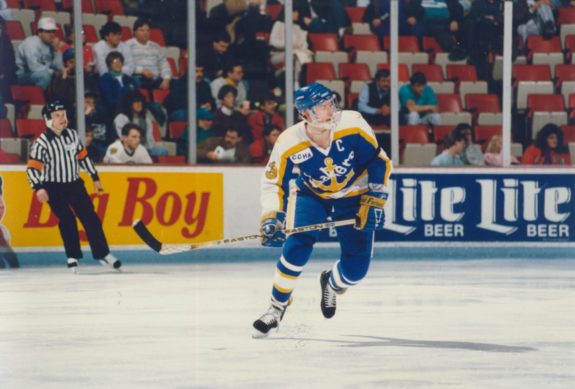
The Lakers won the CCHA Tournament by beating Michigan, and made it back to the championship game after beating Minnesota and Michigan State in the national tournament. This placed the Lakers up against Wisconsin, and the game ended up being fairly controversial. Wisconsin received the brunt of the penalty calls throughout the game, including a few in the third period that may have kept the Badgers from tying the game. (from ‘NCAA PENALTIES HIT WISCONSIN,’ Chicago Tribune, 04/23/1992) Nonetheless, the Lakers were able to prevail, capturing their second championship with the 5-3 win.
1993: University of Maine
In 1984, a select group of teams left the overly-crowded ECAC to form a new conference, the Hockey East Association. However, since their beginnings, not a single team from the conference had made it to the championship game. That changed in 1993.
The Maine Black Bears had come close in 1990 and 1991, losing in the semifinals both times. In the 1992-93 season, they were bolstered by a dominant young freshman by the name of Paul Kariya. The youngster led the country with 100 points, and became the first-ever freshman to win the Hobey Baker Award. Along with high-scoring forwards Jim Montgomery and Cal Ingraham, and a dynamic goaltending duo with future NHLers in Garth Snow and Mike Dunham, the Black Bears went 35-1-2 in the regular season, and easily won the Hockey East Tournament.
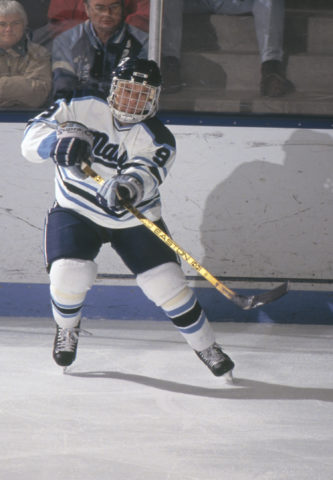
After taking down Minnesota, the Black Bears had to go to overtime to defeat Michigan to advance to the national championship game. There, they faced the defending champion Lake Superior State. Maine took a 2-0 lead before the Lakers stormed back with four goals of their own. Down two in the third period, Montgomery scored the fastest hat trick in championship game history, scoring three in 4:35. That proved to be enough as Snow shut the door and the Black Bears won their first championship by a score of 5-4.
1994: Lake Superior State University
Seething from the disappointment from missing out on being the first team to win back-to-back championships since 1972, the Lakers wanted to go back to the Frozen Four. It was not going to be easy, though, as the Lakers had an overhaul of players after many graduated in 1993.
Related: Why the Vezina Trophy Deserves Its Name
Lake Superior State worked their way through the season with a 24-9-4 record, finishing second in the CCHA. Sean Tallaire and Clayton Beddoes were the only two players to crack the 50-point barrier, but it was Laker netminder Blaine Lacher who was responsible for the team’s winning ways. His 1.98 GAA and .918 SV% were both the best among NCAA goaltenders.
The Lakers’ run to the championship was not an easy one. Following losing to Michigan in the CCHA championship, they were forced to play in the regional semifinals. After outlasting Northeastern in overtime, the Lakers avenged their CCHA Championship loss to the Wolverines in the quarterfinals with another overtime victory. That was followed by another win in extra time, beating Harvard to send the Lakers back to the championship game.
After three overtime games, it looked like the Lakers’ opponent, Hockey East Champion Boston University, were going to have a cakewalk. It proved to be quite the opposite. The Terriers were held to only two shots in the first period, and Lake Superior State kept control of the game from start-to-finish, with seven different players scoring. The 9-1 win would give the Lakers their third title in seven years.
1995: Boston University
After suffering a loss in the most lopsided championship game in over 30 years, the Terriers featured a plethora of returning talent, and a rejuvenated bunch who knew they had a chance to make it back to the top.
Boston had a decent start to the season, but turned it on after the holidays, only losing three of their final 17 games to earn a share of the Hockey East regular-season crown with Maine. The Terriers were led, offensively, by Chris O’Sullivan and All-American Mike Grier. O’Sullivan led BU with 56 points, with Grier finishing tied for the team lead in goals with Jacques Joubert with 29.
After winning the Hockey East Championship, Boston got a chance at redemption at Lake Superior State in the regional finals. Boston won convicingly 6-2, before taking down Minnesota to go back to the championship game. They would go up against Maine, making it the first time that fans saw an all-Hockey East final.
The Black Bears were feeling weary after beating Michigan in a triple-overtime thriller in their semifinal. The fatigue showed in Maine, as the Terriers were all over the Black Bears from start to finish, having a 39-23 shot advantage. A pair of goals from O’Sullivan, and a goal and two assists from Steve Thornton helped BU pick up the 6-2 win, and give the school their fourth national championship, and first since 1978.
1996: University of Michigan
It had been 32 years since the Michigan Wolverines had won the national championship, and it had been 40 years since the Wolverines had dominated the college hockey world. Yet, they were back in the national tournament picture under the guidance of head coach Red Berenson.
The 1995-96 season was not Michigan’s strongest compared to their past few seasons, but they still finished with a respectable 27-7-2 record, coming in second in the CCHA to Lake Superior State. All-American Brendan Morrison led the Wolverines with 72 points, finishing sixth in the NCAA in scoring. Goaltender Marty Turco was not so bad either, with a 2.16 GAA that was second in the country.
The Wolverines opened their run to the championship by taking on Minnesota in the regional final. Trailing in the game, Mike Legg decided to score the sickest goal in the history of the sport.
I do not care how many times Andrei Svechnikov pulls it off, it is still called “The Michigan”.
The Wolverines went on to win that game and their semifinal contest against the defending champion Boston University, pitting the Wolverines against Colorado College. It only seemed fitting as the two teams faced off in the championship game three times in the 50s.
Bill Muckalt scored to give Michigan an early lead, but the Tigers bounced back with two of their own in the second. Legg scored a normal-looking goal in the third to tie the game at two, sending the game to overtime. Just minutes into the extra frame, Morrison banged in a rebound to give Michigan their first championship since 1964.
1997: University of North Dakota
10 years prior, in 1987, North Dakota was capping off an incredible decade, winning three national championships. Since then, they only made the national tournament once.
The team, under third-year head coach Dean Blais, caught fire in the 1996-97 season. The Fighting Sioux started the season 6-0, and finished with a 24-10-2 record, ending up as WCHA regular-season champions. David Hoogsteen led North Dakota with 54 points, but it was the Sioux’s defence that was key. This was led by netminder Aaron Schweitzer, whose 2.31 GAA was third in the country.
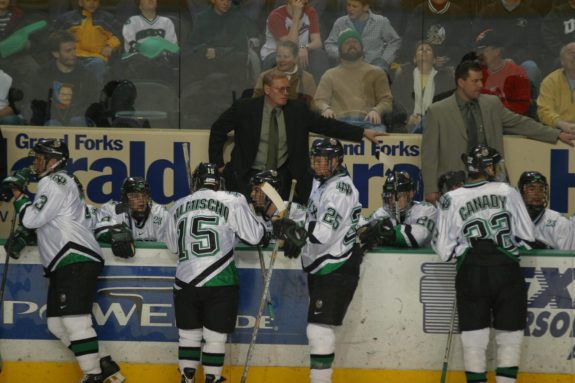
After winning their sixth WCHA conference championship, the Sioux defeated both Cornell and Colorado College, both by 6-2 scores, to make it to the final. They would take on a Boston University team that had made it to the Frozen Four seven times so far in the decade. The Terriers would have a two-goal lead in the first period, before six goals were scored in the middle frame, five of which came from the Sioux. Despite a late charge by Boston, North Dakota would hold on to win their sixth championship by a final score of 6-4.
1998: University of Michigan
The Michigan Wolverines felt like they missed out in 1997, with probably one the best teams in program history led by Hobey Baker winner Brendan Morrison, the Wolverines lost in the semifinal to Boston University.
Still, with a few remaining players from the 1996 championship team and 10 freshmen, the Wolverines looked to be a top team in the country. Yet, their inexperience showed throughout the season, ending up with a 34-11-1 record, and would go on to finish second in the CCHA standings. Bill Muckalt finished second in the country in scoring with 67 points, while also being tied for third in goals with 32.
Even though they lost in the CCHA tournament semifinal, the Wolverines would still earn an at-large bid into the national tournament. The Wolverines were fortunate enough that the West Regional was taking place at their home rink, the famous Yost Ice Arena. After squeaking by Princeton in the opening round, the Wolverines came from behind to knock off the defending national champions, North Dakota, to make it back to the Frozen Four.
After an easy win over New Hampshire, the Wolverines took on Boston College, who was making their first championship game appearance since 1978, in front of a ruckus Eagles fanbase inside the Fleet Center in Boston. The tight battle ended up going to overtime, with Marty Turco, and the goal posts, having to bail out the Wolverines. Late in the first overtime, Josh Langfeld fired a shot that sneaked by Eagles’ netminder Scott Clemmensen, giving the Wolverines their record ninth national championship.
1999: University of Maine
The Black Bears loss in the 1995 final seemed to have worn on the program. The team would miss the national tournament after failing to get through the Hockey East tournament in each of the next three seasons.
That changed in 1998-99. The Black Bears came flying out of the gates with a 6-0 record, and set the pace for much of the remainder of the regular season. Their 26-5-4 record placed them as the No. 1 team in the country, but finished second in the Hockey East standings. Following in his older brother’s footsteps, Steve Kariya led the Black Bears in scoring with 65 points, finishing tied for fourth in the country in points.
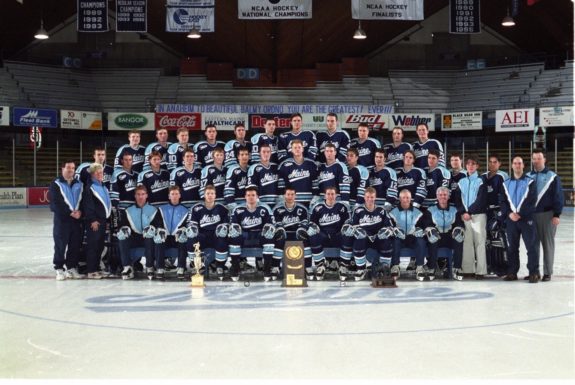
Despite falling in the Hockey East Championship to Boston College, Maine still qualified for the national tournament. They made it to the Frozen Four after wins over Ohio State and Clarkson. In the semifinals, the Black Bears avenged their tournament championship loss to the Eagles with an overtime victory.
For the second time in the decade, the championship game would be between two Hockey East programs, as Maine would take on New Hampshire. Each team scored back-to-back goals, and for the second year in a row, the championship would be decided in overtime. Just passed the halfway mark of the extra frame, Marcus Gustafsson scored to give the Black Bears their second championship.
The 90s were an exciting time for college hockey. While the game itself was changing, it became more interesting, and brought more fans in than ever before. Many overtime classics left the viewers intrigued, which carried over into the new millenium.
The post NCAA Hockey National Championship History: The 1990s appeared first on The Hockey Writers.
Popular Articles

















































 Blackhawks Chicago
Blackhawks Chicago Panthers Florida
Panthers Florida Penguins Pittsburgh
Penguins Pittsburgh Rangers New York
Rangers New York Avalanche Colorado
Avalanche Colorado Kings Los Angeles
Kings Los Angeles Maple Leafs Toronto
Maple Leafs Toronto Bruins Boston
Bruins Boston Capitals Washington
Capitals Washington Flames Calgary
Flames Calgary Oilers Edmonton
Oilers Edmonton Golden Knights Vegas
Golden Knights Vegas Flyers Philadelphia
Flyers Philadelphia Senators Ottawa
Senators Ottawa Lightning Tampa Bay
Lightning Tampa Bay Red Wings Detroit
Red Wings Detroit Islanders New York
Islanders New York Sabres Buffalo
Sabres Buffalo Devils New Jersey
Devils New Jersey Hurricanes Carolina
Hurricanes Carolina Stars Dallas
Stars Dallas Jets Winnipeg
Jets Winnipeg Blue Jackets Columbus
Blue Jackets Columbus Predators Nashville
Predators Nashville Wild Minnesota
Wild Minnesota Blues St. Louis
Blues St. Louis Mammoth Utah
Mammoth Utah Ducks Anaheim
Ducks Anaheim Sharks San Jose
Sharks San Jose Canucks Vancouver
Canucks Vancouver


